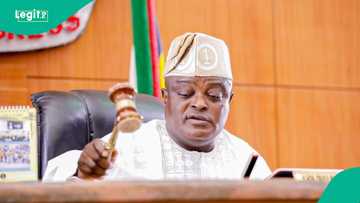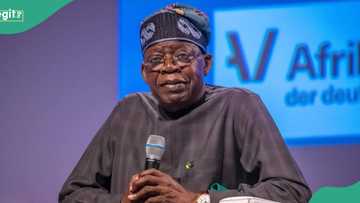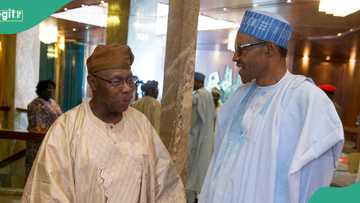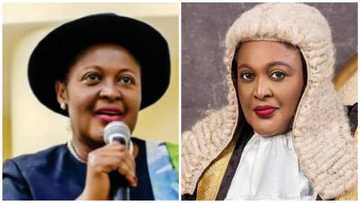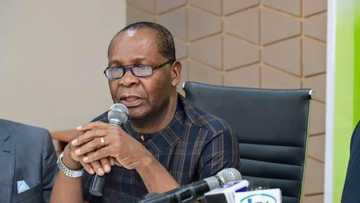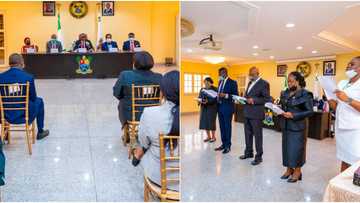Full list, profiles of Nigeria's IG of police since Independence
The Nigerian Police is the principal law enforcement agency in Nigeria. It is a large security organisation consisting of 36 state commands grouped into 12 zones and 7 administrative organs. The agency is currently headed by IGP Ibrahim Kpotun Idris.
Nigeria has had 19 inspectors-general of police, including the current one, since 1964 when the first indigenous IGP took over from the British colonial masters.
Legit.ng provides a catalogue of their profiles:
1. Louis Edet (1964-1966)

The first indigenous IGP, Louis Edet, was born in Calabar in 1914. That was the year the British colonial masters amalgamated the southern and northern protectorate into what is today known as Nigeria. Apart from being born on such a significant date, Edet made history as the man that pioneered the police force through the thorny path of the young republic. He retired in 1966.
2. Kam Salem (1966-1975)
Kam Salem, who took over the leadership of the police from Edet in 1966, also stirred the ship of the force through a difficult phase in the annals of the nation. His reign snowballed into the bitter civil war that almost tore the country into shreds between 1967 and 1970.
3. Muhammadu Dikko Yusuf (1975-1979)

Muhammadu Dikko Yusuf, also known as M.D Yusuf, held the post of IGP during the period of national reconstruction. His tenure straddled two military regimes; from 1975-1979 during the military eras of Generals Murtala Mohammed and Olusegun Obasanjo. He had a long stride in public service.
After retirement, he became the chairman of Nigeria Liquefied Natural Gas (NLNG) in 1994. He was once the chairman of the apex northern socio-political group, Arewa Consultative Forum also in 2000, a position he held until his foray into the murky waters of Nigerian politics where he vied for the president seat in 2003.
READ ALSO: Defections: Sokoto in festive mood ahead of Wamakko, other APC leaders’ arrival (photos)
4. Adamu Suleiman (1979-1981)
Not much is known about Alhaji Adamu Suleiman but the fact is he was IGP during the second republic.
5. Sunday Adewusi (1981-1983)

Born in Ogbomoso in Oyo state, Sunday Adewusi called the shot at the helm of the nation’s police force from 1981-1983. This was the era of the infamous “two-thirds of 19 states” theory of Richard Akinjide’s political arithmetic. He was perceived as having run a force that succumbed to the whims and caprices of the then ruling party.
6. Etim Inyang (1985-1986)

Inyang held sway as police chief during the days of Nigeria’s self-styled military “President” and “Maradona”, Ibrahim Badamasi Babangida. During his tenure, the crime wave billowed. In fact, high profile armed robbery incidents were not only the order of the day but a constant taunt. It was the era of the dreaded Benin-based armed robbery gang led by Lawrence Anini, who glamourised the notorious trade, terrorising the police and other citizens on Benin/Asaba Road axis of the nation.
Inyang had a street named after him in Victoria Island, Lagos; the most enduring epitaph for the Akwa Ibom born police chief.
7. Muhammadu Gambo Jimeta (1986-1990)
Apart from the arrest of notorious Lawrence Anini and his gang, which Inyang set-up before he was relieved of his appointment, Gambo Jimeta had distinguished himself as police commissioner in Lagos state by bringing down the rate of robbery in the Centre of Excellence before his appointment as IGP. He was also a National Security Adviser (NSA) to President Ibrahim Babangida.
8. Aliyu Attah (1990-1993)
Aliyu Attah took over from Gambo in 1990. Not much is attributed to his tenure because of the euphoria of his predecessor’s modest achievement of arresting Anini and gang.
9. Ibrahim Coomassie (1993-1999)
Ibrahim Coomassie, who took over from Attah in 1993, was educated at the Detective Training College, Wakefield, United Kingdom and in Washington DC, USA. His era was punctuated by alleged state-sponsored detentions and murders, including that of Chief Alfred Rewane, Kudirat Abiola and then president-elect, Chief Moshood Kashimawo Olawale (MKO) Abiola, who was said to have been arrested by the police without a warrant.
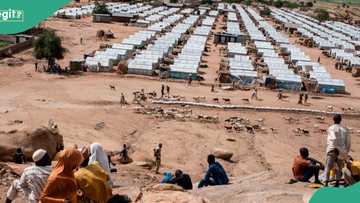
Read also
10 suspected members of Boko Haram arrested in southwestern state, names and location released
10. Musiliu Smith (1999-2002)

Musiliu Smith, who joined the force in 1972 as an Assistant Superintendent of Police (ASP), Enugu Division, was born on April 17, 1946. Smith, who earned a Masters degree in Strategic Studies from the University of Ibadan in 1997, rose to become an Assistant Inspector-General (AIG) of Police in charge of zonal headquarters, Kano.
He was co-opted into Gen. (Rtd) Abdulsalami Abubakar’s Provisional Ruling Council in 1998. He is from Lagos state and his tenure made history as the one that recorded the first revolt by the rank and file of the force. He was, thereafter, forced to proceed on compulsory retirement.
Smith was recently appointed by President Muhammadu Buhari as the chairman of Police Service Commission.
11. Mustafa Adebayo Balogun (2002-2005)

Mustafa Adebayo Balogun, popularly called Tafa Balogun, succeeded Smith on March 6, 2002, as the 11th IGP with a mandate to instil discipline within the rank and file of the force. Born on August 8, 1947, in Ila- Orogun, Osun state, Balogun got enlisted in the force in May 1973.

Read also
Timileyin: Amnesty Int'l sends message to authorities as 'gospel singer' allegedly kills NYSC member
He was variously commissioner of police in Edo, Delta, Rivers and Abia states and also headed the Zone 1, Kano as AIG. He presided over the April 2003 general elections, which were perceived to be marred by electoral fraud and police abuses.
Incidents of press gagging and brutality against journalists were also rife under him. It was to his credit though that the police unravelled the dreaded Okija shrine in Anambra state where politicians routinely re-fuel allegiance to godfathers at the expense of the public.
Balogun basked in the reputation of being the first Mobile Cop to head the force as well as the first to be arrested, arraigned, and incarcerated over large-scale corruption charges ranging from theft to illegal acquisition of confiscated properties seized from politicians by the Economic and Financial Crimes Commission (EFCC) under its pioneer chairman Nuhu Ribadu. This led to his forced resignation in January 2005.
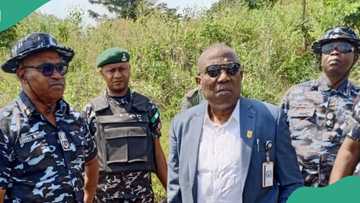
Read also
Tears, tension as gunmen kill final-year student in Akwa Ibom, “the victim was very popular"
READ ALSO: How can I be on the same side with Atiku - Obasanjo
12. Sunday Ehindero (2005-2007)

Sunday Ehindero, from Ondo state, was saddled with the herculean task of laundering the battered image of the force following Balogun’s disgrace. He graduated in Law from the University of Ibadan. In Feb 2006, Ehindero sponsored a bill in the National Assembly for the removal of gender bias that was prevalent then in the force and accused Balogun of recruiting “dirty cops” into the Force.
Ehindero retired from the force in 2007 but faced several probes thereafter regarding a N21 million fraud, diversion of N2.5 billion of police cooperative money, and another N300 million police fund.
13. Mike Mbama Okiro (2007-2009)

The Rivers state-born police chief, whom many believed hailed from Egbema in Imo state, took over from Ehindero in 2009. He was appointed by late President Umaru Yar’Adua on May 29, 2007, in the first civilian to civilian transition. He enlisted in the Force on August 1, 1977, as an ASP. He enjoyed a double promotion from Commissioner of Police (CP) to Deputy Inspector-General (DIG) of Police.
Shortly after being appointed, Okiro reinstated several officers who were forced into early retirement and headed the inter-agency panel to investigate the $190million Halliburton Scam, indicting KBR, a Halliburton subsidiary, of bribing Nigerian government officials to curry construction contracts from the NLNG.
After his retirement in July 2009 at the age 60 years, Okiro got a rare commendation from President Yar’Adua on his achievements while in office.
14. Ogbonna Okechukwu (2009-2010)

Ogbonnaya Okechukwu Onovo is from Enugu state. He succeeded Okiro in July 2007 as the first Igbo to head the force. He had felt the exalted position in an acting capacity before Okiro’s appointment though. Between 1998 and 2000, he presided over the National Drug Law Enforcement Agency (NDLEA) as chairman and was promoted to DIG on March 14, 2002, having served three IGs, Balogun, Ehindero and Okiro in that role.
Onovo’s tenure was characterised by a prevalence of kidnappings for ransoms. His perceived inability to checkmate kidnappings and killings reportedly led to his inglorious exit from the force, even before attaining the mandatory retirement age.
15. Hafiz Ringim (2010-2012)

Hafiz Ringim enlisted as a cadet inspector on March 1, 1977. He rose through the ranks to become the IGP when he succeeded Onovo on September 10, 2010. His tenure witnessed, perhaps, the most daring security affront with the bombing of a section of the Force Headquarters by the Boko Haram terrorists. Many other bombings were rampant throughout his tenure.
The most dastardly ones being the 2011 Christmas Day bombing at the St. Theresa Catholic Church, Madalla, near Abuja, which claimed over 40 lives and that of Kano that claimed no less than 185 lives. He retired on January 25, 2012.
16. Mohammed Dahiru Abubakar (2012-2014)

Mohammed Dahiru Abubakar mounted the saddle in an acting capacity on January 25, 2012, following Ringim’s retirement. Before then, he was AIG in charge of Zone 12, Bauchi, which is the stronghold of the Boko Haram sect. He once was a commissioner of police in Lagos. He identified corruption, inadequate training and absence of tactics and equipment, among others as the bane of the Force but did little to solve the problems. His most transparent achievement was the introduction of a new “camouflage” uniform similar to that used by the military, for the police.
PAY ATTENTION: Read the news on Nigeria’s #1 news app
17. Suleiman Abba (2014-2015)

Just as unheralded as he came, Suleiman Abba, who was the 17th IGP, was fired by President Goodluck Jonathan on Tuesday, April 21. Before his appointment, Abba was the AIG in charge of Zone 7, comprising Abuja and environs. Like Ringim, he hailed from Jigawa state and was promoted above his seniors as AIG.
18. Solomon Arase (2015-2016)

Solomon Arase took over from Abba as the 18th indigenous police boss on Tuesday, April 21 on an acting capacity. Before his appointment, Arase was head of the Force Criminal Intelligence and Investigation Department. He has Bachelors and Masters Degrees in law and political science and strategic studies, according to African Spotlight. He is also a Fellow of the Nigerian Defence College. Arase, unlike his immediate predecessor, was appointed from the rank of a DIG and hails from Edo State.
19. Ibrahim Idris Kpotun (2016-date)

Ibrahim Idris Kpotun is the current IGP appointed by President Muhammadu Buhari. He obtained two academic degrees in law and agriculture at Ahmadu Bello University, Zaria and University of Maiduguri, respectively. Idris had also attended numerous courses and trainings in Nigeria and abroad and partook in several peacekeeping missions in many countries of the world.
Are Nigerian Policemen the worst in the world? - On Legit.ng
Source: Legit.ng


